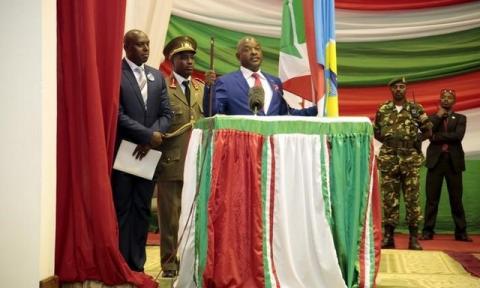Advertisement
U.N. diplomats urge Burundi dialogue as rebels raise stakes
BUJUMBURA (Reuters) - U.N. Security Council diplomats told Burundi officials on Friday that a crisis that has left hundreds dead had to be resolved by dialogue, after rebels raised the stakes by saying a general who led a failed coup in May was now leading their force.
Thursday's announcement by FOREBU that the group was now commanded by the former intelligence chief, General Godefroid Niyombare, deepens concerns that Burundi is sliding back into conflict after its ethnically charged civil war ended in 2005.
U.N. estimates put the death toll at 439 people but it says it could be higher. More than 240,000 people have fled abroad.
Diplomats from the 15-member council arrived in Burundi on Thursday evening and are scheduled to meet President Pierre Nkurunziza later on Friday.
Some of the visitors want to persuade Nkurunziza, whose re-election for a third term sparked the crisis, to accept an African peacekeeping force to prevent an ethnic conflict in a region where memories of Rwanda's 1994 genocide remain fresh.
The president has rejected the deployment, saying they would constitute "an invading force". The issue is expected to be a focus for an African Union summit at the end of January.
"The fighting has to stop and the killings have to stop," deputy French ambassador to the United Nations, Alexis Lamek, told Reuters after diplomats met Burundi's foreign minister, Alain Nyamitwe, adding that dialogue was "the only way".
Burundi's first vice president, Gaston Sindimwo, said the government was open to dialogue. "We can't, at the same time, stand by and allow criminals to have their way," he said.
Months of talks between the government and the opposition last year failed to make progress. A new round of negotiations launched at the end of December in Uganda have already stalled.
Regional Western diplomats say the government has set too many conditions about who can attend talks to make them meaningful. They also say rebels may believe they can make more gains through force of arms than at the negotiating table.
Rebel leader Niyombare disappeared after the coup. Allies said he was alive and still working to unseat Nkurunziza, although he has made no public statements. Other coup plotters have been jailed.
Burundi's 12-year civil war pitted what was then a army led by minority Tutsis against rebels from the majority Hutu ethnic group, including one led by Nkurunziza. Niyombare, a Hutu, had been part of Nkurunziza's rebel CNDD-FDD force.
The crisis has broadly followed political allegiances with Hutus and Tutsis on both sides. The opposition says Nkurunziza's third term violated the constitution and a peace deal that ended the civil war. Loyalists cite a court ruling that he could run.
The government insists there is no ethnic bias, but opponents say districts of Bujumbura where many Tutsis live - and which were also hotbeds of protest against Nkurunziza last year - have been targeted with some Tutsis singled out.
(Writing by Edmund Blair; Editing by Alison Williams)



















Add new comment